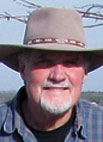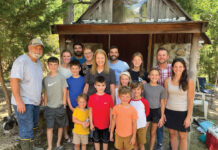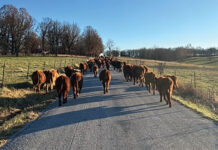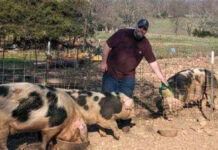
Show winners. Best of Breed. Texas Grand Champion… all right here in this area at Rooster Ridge Farm located in Texas County southeast of Houston, Mo. Dr. David Dale and his wife, Carol, raise Fox Trotter horses, Gaited Mules and Sicilian Miniature Donkeys. They have a medical practice in Houston, but when they come home it is boots and jeans.
The Dale’s bought their first donkeys in 1993 primarily for their children. Carol said, “Today babies are micro-chipped to authenticate bloodlines.
David explained, “There are three sizes of donkeys – miniature, standard and mammoth. We have miniature and mammoth but no standards.” A gaited mule must be certified by the American Gaited Mule Association (AGMA), which is accomplished by personal observation or by video.
In order to be registered, the height of the donkey is measured at the withers. Miniatures can be no taller than 36 inches. David said, “Our miniatures measure 30 to 33 inches. When babies are born they are about 20 inches long and weigh 20 pounds.” He went on to say their hooves are about the size of quarters.
David and Carol have three miniature Jacks, which are red, black and dark brown. Their dark brown Jack, Quarter Moon Deacon, has an extensive show record which includes over 20 ribbons he earned at the National Shows including Texas Grand Champion Miniature Donkey, NMDA Champion Halter Jack where he was Best of Breed and the State Fair of Texas where he placed Reserve Grand Champion. The list goes on and on including, 1st Place Jack at the Ozark Empire Fair.
These small donkeys are harness broke and pull carts as a single or as a team. Once a team is broke to harness they are for sale and another team from their herd is ready for training.
The herd sire for the mules, Red, is a mammoth Jack who is 61 inches tall at the withers. He is certified by the AGMA as a gaited Jack. David said, “We sell ‘trail trained’ gaited mules and the trail training includes learning to travel safely and calmly across rivers, climb hills and mountains and travel through timber terrain.”
Carol is the expert at what they call ground training. Actually, it is mule psychology. All equine have two sides to their brain and both sides have to be trained. Therefore, anything you teach them must be repeated on each side – such as, if they are taught to whirl to the right at a command they must also be taught to whirl to the left with a different motion. Carol said, “This teaches them to be a thinking animal instead of a reactive animal.
Carol said, “To start this training you teach them through your body language. You make and maintain eye contact with them and walk backward away from them. They will follow you. If you go forward, they will back up.” Gradually, you establish your dominance and gain their trust.
In addition to the mules and donkeys the Dale’s have 16 Fox Trotters, which includes an outstanding stallion they use for show and breeding. They train the Fox Trotter’s themselves, but do not show much anymore because they prefer to trail ride.
All animals graze on Fescue, however, they do limit the amount of spring grass consumed. The farm is divided into six pastures so they can be moved if necessary. The mules, miniatures and horses all are fed Brome hay and dry oats. Occasionally they are fed high protein pellets to supplement their diet. Mineral blocks are available to everything at all times. David said, “Basically, mules and donkeys are easy to raise. They need shelter, fresh water and good quality roughage.” Donkeys metabolize protein very efficiently and thrive on most any kind of terrain.
The Dale’s have very good quality animals and are continually improving each individual breed’s confirmation and disposition.







